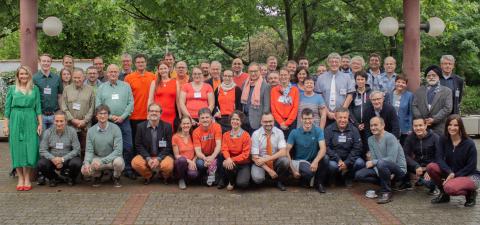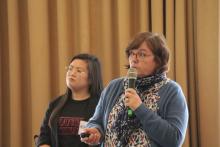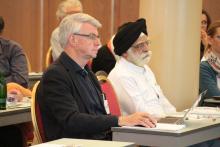Feed-a-Gene 4th annual meeting 2019
The fourth annual meeting of the Feed-a-Gene project took place on 14-16 May 2019 in Budapest, Hungary. It was organized by the staff of Kaposvár University, one of the project partners. The meeting was attended by 56 people. During this meeting, Feed-a-Gene partners presented the work done so far, shared their results and planned activities for the next year. All attendees appreciated the organization of the meeting by Veronika Halas and her team at Kaposvár University. Feed-a-Gene project coordinator Jaap van Milgen and project manager Vincent Troillard would like to thank all the people at Kaposvár University who made this meeting possible and enjoyable.
A year of results
During the meeting, researchers presented 21 oral communications, more than twice the number presented in the last annual meeting. Feed-a-Gene has produced more than 150 publications, including 21 peer-reviewed papers. Public deliverables are now available on the Feed-a-Gene website.
SmartCow
Dr. Nicolas Friggens (INRA AgroParisTech) presented SmartCow (www.smartcow.eu), a H2020 European project (2018-2022) that integrates key European cattle research infrastructures to promote their use and development and thereby help the European cattle sector face the challenge of sustainable production. Covering all the relevant scientific fields and the diversity of cattle types and production systems, SmartCow will provide the research communities with easy access to 11 major research infrastructures from 7 countries, in order to develop innovative and ethical solutions for efficient use of animal and feed resources that promote animal welfare and healthy livestock, as well as sustainable competitiveness.
Ontologies for livestock: a tool for knowledge sharing and phenotypic data exploitation
Linh Chi Nguyen and Catherine Hurtaud (INRA) presented the concept of ontology. An ontology is a formal way of representing knowledge in which concepts in a particular field of knowledge are described both by their meaning and their relationship to each other. Of particular interest for Feed-a-Gene is ATOL (Animal Trait Ontology for Livestock, www.atol-ontology.com), a multi-species and multi-disciplinary ontology of characteristics defining phenotypes of livestock in their environment that is developed and maintained by INRA.
SAB recommendations: focus on reaching stakeholders and policy makers
The stakeholder advisory board (SAB) praised the project for its management, the positive attitude of its research teams and its promising results.
- Its main recommendation is to focus on creating and delivering communication material that will integrate seamlessly the results of the different work packages. The messages should be tailored to specific groups of stakeholders.
- For stakeholders including farmers and industry: factsheets, practice abstracts, articles for trade magazines, webinars, press releases.
- For policy makers: policy briefs. Some policy briefs could focus on recommendations for follow-up activities (Innovation Actions) and research projects (Research and Innovation Actions, FP9).





